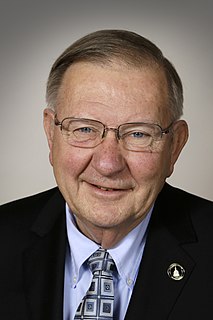
The 1978 United States Senate elections in the middle of Democratic President Jimmy Carter's term. Thirteen seats changed hands between parties. The Democrats at first lost a net of two seats to the Republicans, and then one more in a special election. Democrats nevertheless retained a 58-41 majority.

The 2008 United States House of Representatives elections were held on November 4, 2008, to elect members to the United States House of Representatives to serve in the 111th United States Congress from January 3, 2009, until January 3, 2011. It coincided with the election of Barack Obama as President. All 435 voting seats, as well as all 6 non-voting seats, were up for election. The Democratic Party, which won a majority of seats in the 2006 election, expanded its control in 2008. The Republican Party, hoping to regain the majority it lost in the 2006 election or at least expand its congressional membership, lost additional seats. With one exception, the only seats to switch from Democratic to Republican had been Republican-held prior to the 2006 elections. Republicans gained five Democratic seats total, while losing 26 of their own, giving the Democrats a net gain of 21 seats, effectively erasing all gains made by the GOP since 1994. In addition, with the defeat of a Republican congressman in Connecticut's 4th district, this became the first time since the 1850s that no Republican represented the New England region. The 10.6% popular vote advantage by the Democrats was the largest by either party since 1982, 26 years earlier. Turnout increased due to the 2008 presidential election. The presidential election, 2008 Senate elections, and 2008 state gubernatorial elections, as well as many other state and local elections, occurred on the same date.
Bernhart Henn was a pioneer lawyer and businessman, and a two-term Democratic U.S. Representative from Iowa's 1st congressional district during Iowa's first decade of statehood.

David Wayne Loebsack is an American politician serving as the U.S. Representative for Iowa's 2nd congressional district since 2007. A member of the Democratic Party, he also is an emeritus professor of political science at Cornell College, where he had taught since 1982. The district includes most of Iowa's southeastern quadrant, including Davenport, Bettendorf, Burlington and Iowa City.

In Iowa, midterm elections for the state's five Congressional seats took place November 7, 2006. Each race was contested, pitting the winners of the Republican and Democratic primaries conducted June 6.

The Iowa Senate is the upper house of the Iowa General Assembly, United States. There are 50 seats in the Iowa Senate, representing 50 single-member districts across the state of Iowa with populations of approximately 60,927 per constituency, as of the 2010 United States Census. Each Senate district is composed of two House districts. The Senate meets at the Iowa State Capitol in Des Moines.

There were two sets of 2006 Iowa House of Representatives elections. The first, the general election, was held on November 7. The second, a special election for District 52, was held on December 12. The representatives-elect from both sets of elections were inaugurated on January 3, 2007. The Iowa House, like the United States House of Representatives, is up for re-election in its entirety every two years. Prior to the elections, the Republicans were in the majority; following inauguration, the Democrats were in the majority – this marked the first time in 42 years that the Democrats had controlled both branches of the Iowa General Assembly and the Governor's Office at the same time.

Walter Kurt Schrader is an American politician who has been the U.S. Representative for Oregon's 5th congressional district since 2009. He is a member of the Democratic Party and previously served in both houses of the Oregon Legislative Assembly.

The 2010 House elections in Iowa occurred on November 2, 2010 and elected the members of the State of Iowa's delegation to the United States House of Representatives. Representatives are elected for two-year terms; those elected served in the 112th Congress from January 3, 2011 until January 3, 2013. Iowa has five seats in the House, apportioned according to the 2000 United States Census.

The 2014 United States House of Representatives elections in Iowa were held on Tuesday, November 4, 2014, to elect the four U.S. Representatives from the state of Iowa, one from each of the state's four congressional districts. The elections coincided with the elections of other federal and state offices, including Governor of Iowa and United States Senate. Primary elections were held on June 4, 2014. As no candidate won more than 35% of the vote in the 3rd district Republican primary, that nomination was decided at a party convention on June 21.

The 2016 United States elections were held on Tuesday, November 8, 2016. During this presidential election year, the President of the United States and Vice President were elected. In addition, elections were held for all 435 voting-member seats in the United States House of Representatives and 34 of the 100 seats in the United States Senate to determine the 115th Congress.

The 2017 United States elections were held, in large part, on Tuesday, November 7, 2017. This off-year election featured gubernatorial elections in Virginia and New Jersey, as well as state legislative elections in both houses of the New Jersey Legislature and in the Virginia House of Delegates. Numerous citizen initiatives, mayoral races, and a variety of other local elections also occurred. Special elections were also held for one seat of the U.S. Senate, representing Alabama, and six seats of the U.S. House of Representatives.

Elections to the United States Senate will be held on November 3, 2020, with the 33 Class 2 seats of the Senate being contested in regular elections. The winners will be elected to six-year terms extending from January 3, 2021, until January 3, 2027. Additionally, there will be a special election in Arizona to fill the vacancy created by the death of John McCain in 2018.

The 2016 United States House of Representatives elections in Michigan were held on November 8, 2016, to elect the 14 U.S. Representatives from the state of Michigan, one from each of the state's 14 congressional districts. The elections coincided with the 2016 U.S. presidential election, as well as other elections to the House of Representatives, elections to the United States Senate in 33 other states and various state and local elections. The deadline for candidates to file for the August 2 primary election was April 19.

The 2020 United States elections will be held on Tuesday, November 3, 2020. All 435 seats in the United States House of Representatives, 34 of the 100 seats in the United States Senate, and the office of President of the United States will be contested. Thirteen state and territorial governorships, as well as numerous other state and local elections, will also be contested.

The 2018 United States House of Representatives elections were held on November 6, 2018, with early voting taking place in some states in the weeks preceding that date. Voters chose representatives from all 435 congressional districts across each of the 50 U.S. states. Non-voting delegates from the District of Columbia and four of the five inhabited U.S. territories were also elected. These midterm elections took place nearly halfway through the first term of Republican President Donald Trump. On Election Day, Republicans had held a House majority since January 2011.
Statewide and municipal elections were held in the U.S. state of Virginia on November 7, 2017. The main election being held in Virginia was the state's gubernatorial election. In addition, all of Virginia's House of Delegates seats were up for re-election. Primary elections for the House of Delegates and the governor were held on June 13, 2017. Ralph Northam (D) was elected to become the 73rd Governor of Virginia, Justin Fairfax (D) was elected to become the 41st Lieutenant Governor of Virginia, and Mark Herring (D) was reelected as the 47th Attorney General of Virginia.

Todd Prichard is a Democratic member of the Iowa House of Representatives, representing the 52nd district. Prichard was first elected in a January 22, 2013 special election.
Emilio Vazquez is a former Democratic member of the Pennsylvania House of Representatives who represented the 197th House district in Philadelphia, Pennsylvania.
Eric Giddens is an American politician in the state of Iowa. A Democrat, he was elected to the Iowa State Senate's 30th district defeating Republican Walt Rogers in a special election held on March 19, 2019, to replace Jeff Danielson. Giddens was a member of the Cedar Falls, Iowa School Board and a program director at the University of Northern Iowa's Center for Energy and Environmental Education.














